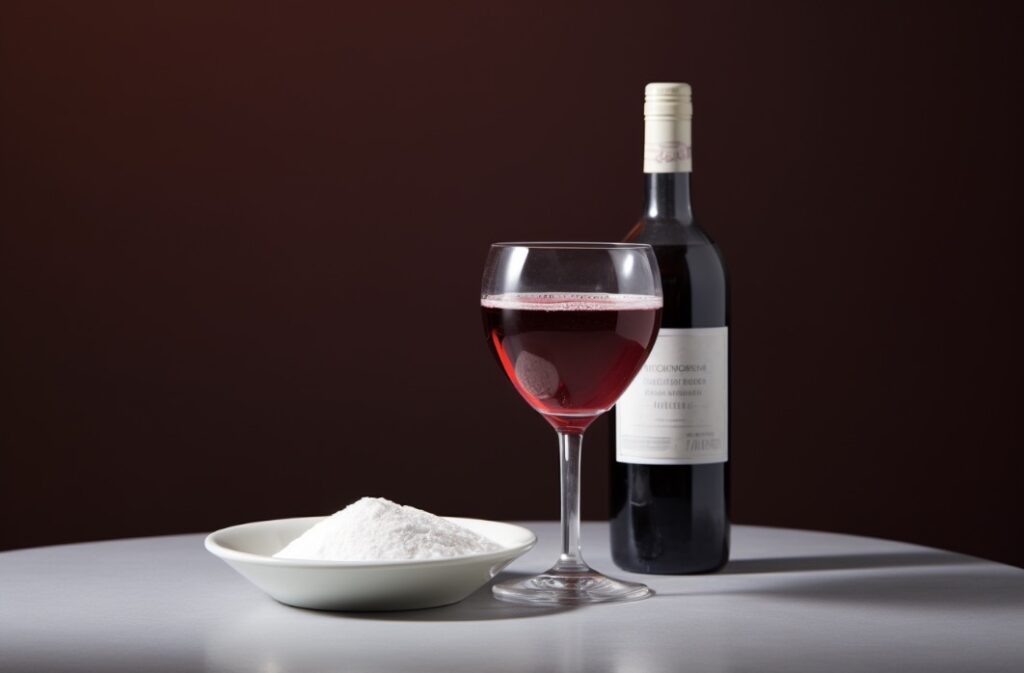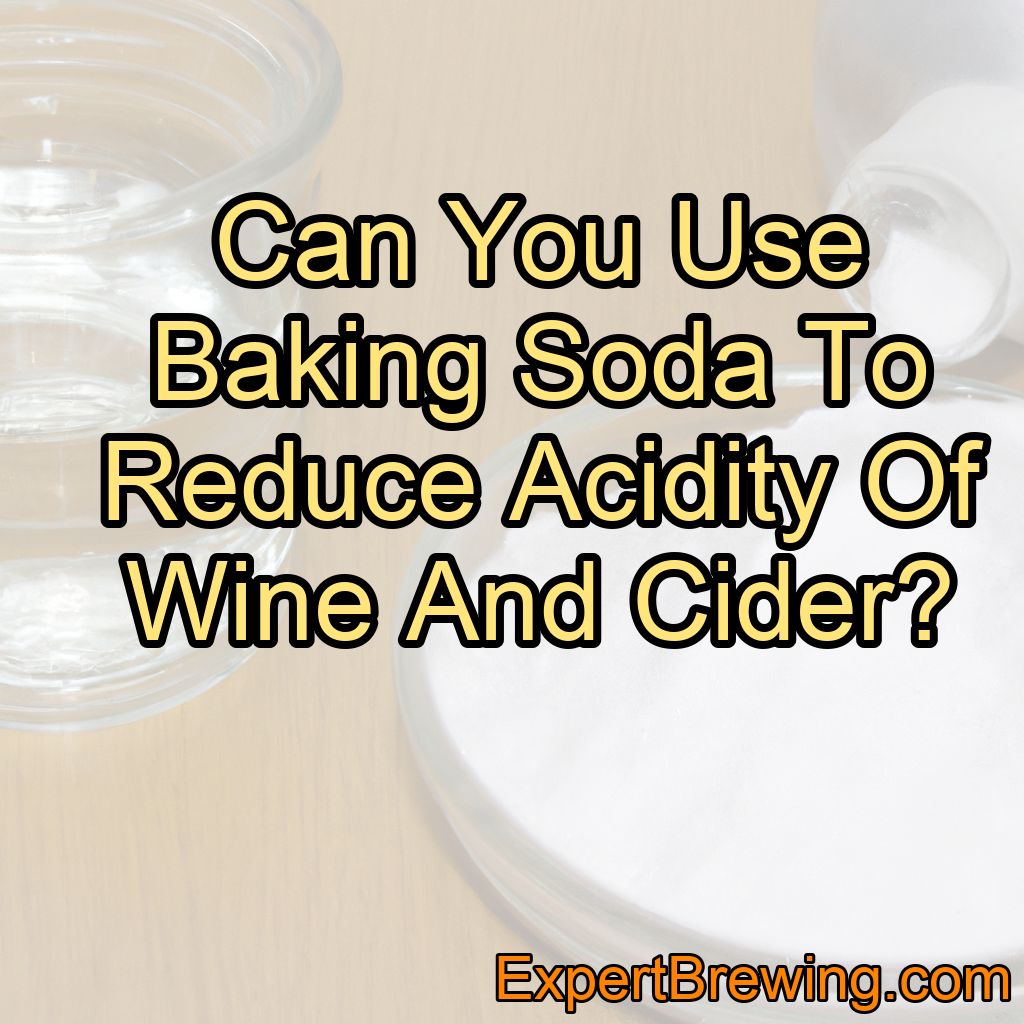As a homebrewer with years of experience under my belt, I love experimenting with different methods and ingredients to create the perfect wine or cider.
One of the most important aspects of brewing is managing acidity levels, as this not only affects the taste but also the stability and aging potential of the final product.
In this article, I will explore the use of baking soda as a means to reduce acidity in wines and ciders, weighing the pros and cons of this common household ingredient.
Using baking soda to reduce acidity in wine or cider can be effective, but it is not without its drawbacks.
The pros include its affordability, accessibility, and ability to raise pH levels, while the cons involve potential flavor alterations, overuse risks, and the possibility of introducing contaminants.
The Chemistry of Acidity and Baking Soda
Before diving into the pros and cons of using baking soda to reduce acidity, it’s important to understand the chemistry behind this process.
The acidity of a solution is determined by its pH level – a scale that ranges from 0 (most acidic) to 14 (most alkaline). Wine and cider typically have a pH between 3 and 4, making them acidic.
Baking soda (sodium bicarbonate) is a weak alkaline compound that can neutralize acids when mixed with them. In the case of wine and cider, adding baking soda will react with the acidic compounds, primarily tartaric and malic acids, and raise the pH level.
This results in a decrease in acidity, which can help balance the flavor profile and improve overall quality.
1. Affordability and Accessibility
One of the main advantages of using baking soda to reduce acidity in wine and cider is its affordability and accessibility. Baking soda is a common household item, readily available at most grocery stores for a low price. In comparison, other acidity-reducing agents, such as calcium carbonate, potassium bicarbonate, or specialized wine-making products, may be more difficult to find or more expensive.

2. Effectiveness in Raising pH Levels
Baking soda is effective at raising the pH level of wine and cider, thus reducing acidity. A small amount of baking soda can neutralize a significant amount of acid, making it a powerful tool for adjusting the acidity of your brew. This can be particularly helpful if your fruit source has an unusually high acidity level, or if your fermentation process has resulted in a more acidic product than desired.
3. Easy Measurement and Application
Using baking soda to reduce acidity is relatively simple and straightforward, making it an appealing option for both novice and experienced brewers. By dissolving a measured amount of baking soda in water and adding it to the wine or cider, you can quickly and easily adjust the acidity level. This allows for precise control over the final product, as you can incrementally add more baking soda until the desired pH level is reached.

Potential Drawbacks of Using Baking Soda
While baking soda offers several benefits in reducing acidity, it is not without its drawbacks. These potential downsides should be carefully considered before choosing to use baking soda in your wine or cider.
4. Flavor Alterations
One of the primary concerns with using baking soda to reduce acidity is the potential for flavor alterations. While some acidity reduction can improve the balance and taste of your wine or cider, too much can result in a flat, dull, or uninteresting flavor profile. Additionally, the sodium content of baking soda may introduce a subtle saltiness to the final product, which may not be desirable in some cases.
5. Overuse Risks
Because baking soda is so effective at neutralizing acid, it is important to use it sparingly and carefully. Overuse can quickly result in a product with an undesirable pH level, leading to the aforementioned flavor alterations or even spoilage. It is crucial to measure your wine or cider’s pH level before and after adding baking soda to ensure that you do not inadvertently create an unpalatable or unsafe product.
6. Introduction of Contaminants
Lastly, using baking soda to reduce acidity in wine and cider carries the risk of introducing contaminants. While food-grade baking soda is generally safe for consumption, impurities or contaminants may be present in some products. This could potentially introduce unwanted flavors, odors, or substances into your wine or cider, negatively impacting the final product.
Conclusion
In conclusion, using baking soda to reduce acidity in wine and cider can be effective, but it is not without its drawbacks. The pros of using baking soda include its affordability, accessibility, and effectiveness in raising pH levels, while the cons involve potential flavor alterations, overuse risks, and the possibility of introducing contaminants.
To help you make an informed decision on whether to use baking soda in your wine or cider making process, here are 10 facts about reducing acidity with baking soda:
1. Baking soda is a weak alkaline compound that can neutralize acids, such as those found in wine and cider.
2. The acidity of a solution is determined by its pH level, with wine and cider typically having a pH between 3 and 4.
3. Baking soda is an affordable and accessible option for reducing acidity in comparison to other specialized wine-making products.
4. A small amount of baking soda can neutralize a significant amount of acid, making it effective at raising pH levels.
5. Using baking soda to reduce acidity is relatively easy, requiring only simple measurement and application.
6. One potential drawback of using baking soda is the possibility of altering the flavor profile, leading to a flat or dull taste.
7. Overuse of baking soda can result in an undesirable pH level and potential spoilage of the final product.
8. The sodium content of baking soda may introduce a subtle saltiness to the wine or cider, which may not be desirable in some cases.
9. Impurities or contaminants present in some baking soda products could negatively impact the final product.
10. It is crucial to measure your wine or cider’s pH level before and after adding baking soda to ensure that you do not inadvertently create an unpalatable or unsafe product.
FAQs
Is it safe to drink apple cider and baking soda?
It is generally safe to drink apple cider vinegar and baking soda in moderate amounts, but it is important to dilute them properly and not consume them in excess as they can cause side effects such as stomach upset and electrolyte imbalances. It is recommended to consult with a healthcare provider before regularly consuming this mixture.
What happens when you mix apple cider and baking soda?
When you mix apple cider and baking soda, a chemical reaction occurs that produces carbon dioxide gas. This can cause the mixture to foam and bubble up, so it is important to mix the two ingredients slowly and carefully in a large container. The resulting mixture can be used as a natural cleaning solution or as a home remedy for various ailments.
Does drinking apple cider vinegar and baking soda help lose weight?
There is no scientific evidence to support the claim that drinking apple cider vinegar and baking soda can help with weight loss. In fact, consuming large amounts of apple cider vinegar and baking soda can be harmful to your health. It is important to maintain a balanced diet and exercise regularly to achieve and maintain a healthy weight.
What happens if you add baking soda to wine?
Adding baking soda to wine can increase its pH level and reduce its acidity. This can alter the taste and aroma of the wine, making it less acidic and potentially sweeter. However, it is not recommended to add baking soda to wine as it can also affect the overall balance and quality of the wine. It is better to choose a wine that suits your taste preferences rather than trying to alter it with baking soda.
What happens when you mix baking soda and apple cider?
When baking soda and apple cider are mixed, a chemical reaction occurs that produces carbon dioxide gas. This reaction causes the mixture to bubble and fizz.
What is the benefit of apple cider and baking soda?
Apple cider vinegar and baking soda have been touted for their potential health benefits, including aiding in digestion, balancing pH levels in the body, and promoting weight loss. However, there is limited scientific evidence to support these claims, and consuming large amounts of either ingredient can have negative side effects. It is important to consult with a healthcare professional before incorporating apple cider vinegar or baking soda into your diet.





